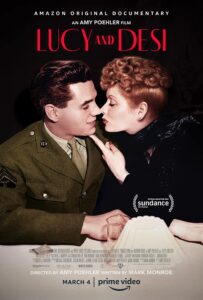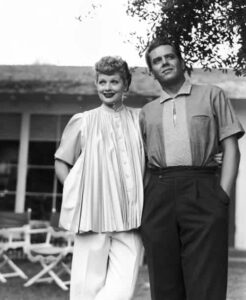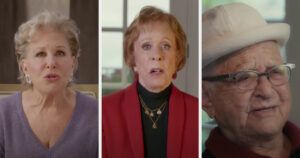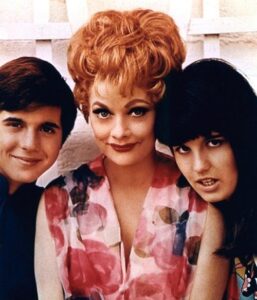 By Steve Crum
By Steve Crum
Lucy and Desi is not the first documentary about the famed Lucille Ball and Desi Arnaz, but it is the best—the definitive. This fine work is comedian Amy Poehler’s baby via her directing. Her professionalism behind the camera is impressive. The superb editing, so vital in any documentary, is by Robert A. Martinez.
Still, what makes Lucy and Desi essential viewing even though at least three or four thematically similar documentaries preceded over the past decades?
First of all, the 102 minutes is loaded with both loving and realistic dialogue and footage. A great deal of the words and pictures have never been seen or heard before. Featured commentator Lucie Arnaz Luckinbill, Lucy & Desi’s daughter, has truly opened the family “secrets,” making public many private cassette recordings made by Lucy and Desi (organized by Lucy—maybe for a future autobiography?) that have some revelations about their feelings and motivations. Thanks to Martinez’ skillful editing, these recordings are shown with the family’s privately shot silent home movies—most of them in color.  The factors perfectly enhance each other.
The factors perfectly enhance each other.
A fraction of the home movie footage has popped up in previous documentaries, but most is new and fascinating. For example, there is the story of Lucy’s very early years visiting her grandfather on his farm. That includes the near fatal rifle shooting on his property that caused him and the family to move to another state. Her grandfather’s later involvement with the Communist Party is also covered, as well as Lucy’s reason for “joining” the Party.
 This incident covers familiar territory exploited in Aaron Sorkin’s recent bio-drama, Being the Ricardos. Lucie Arnaz indirectly notes in this docu that Sorkin’s recreated sequence about J. Edgar Hoover defending Lucille Ball is factual! Many critics have disputed that claim.
This incident covers familiar territory exploited in Aaron Sorkin’s recent bio-drama, Being the Ricardos. Lucie Arnaz indirectly notes in this docu that Sorkin’s recreated sequence about J. Edgar Hoover defending Lucille Ball is factual! Many critics have disputed that claim.
Lucy and Desi runs the gamut of the duo’s incredible career and private life, from their “mixed marriage” to Desi’s alcoholism and philandering to the rise of Desilu Productions. It also digs back into Lucy’s early movie years at RKO and MGM, refugee Desi’s Cuban ancestry (with some incredible footage of his Havana family and home), and the fact that Lucy and Desi were actually married twice. (See the documentary for details.)
There is footage of the pre-I Love Lucy couple guesting on a 1949 TV Ed Wynn Show, and their touring stage show (a precursor to their own TV program). The familiar is repeated here as well: I Love Lucy’s use of a live studio audience and the 3-camera filming innovation; the hiring of Vivian Vance and William Frawley; and Lucy and Desi’s divorce and new  spouses—yet the two continued to love each other.
spouses—yet the two continued to love each other.
I think I had heard about Lucy attributing Buster Keaton for her use of props in comedy, but it seemed fresh to realize her credit. She really did utilize props well to get big laughs.
What Lucy and Desi does NOT mention (even though I wanted to hear about such) is/are the two starring movies they made: The Long, Long Trailer (1953) and Forever Darling (1956). The former is particularly hilarious, even though one might call it an extended I Love Lucy episode.
 Guest speakers include Bette Midler, Carol Burnett, Charo, Norman Lear, Desi Arnaz Jr., Gregg Oppenheimer, and Laura Laplaca.
Guest speakers include Bette Midler, Carol Burnett, Charo, Norman Lear, Desi Arnaz Jr., Gregg Oppenheimer, and Laura Laplaca.
I was happy to hear Lucille Ball’s comment about herself in this documentary, “I’m not a funny person.” For years I have said Lucille Ball was not a great comedian, but instead a great comedy actress.
Lucy and Desi is a sublime documentary for fans. For all of us it is cherished early TV history. And it is a poignant love story.
GRADE on an A-F Scale: A
